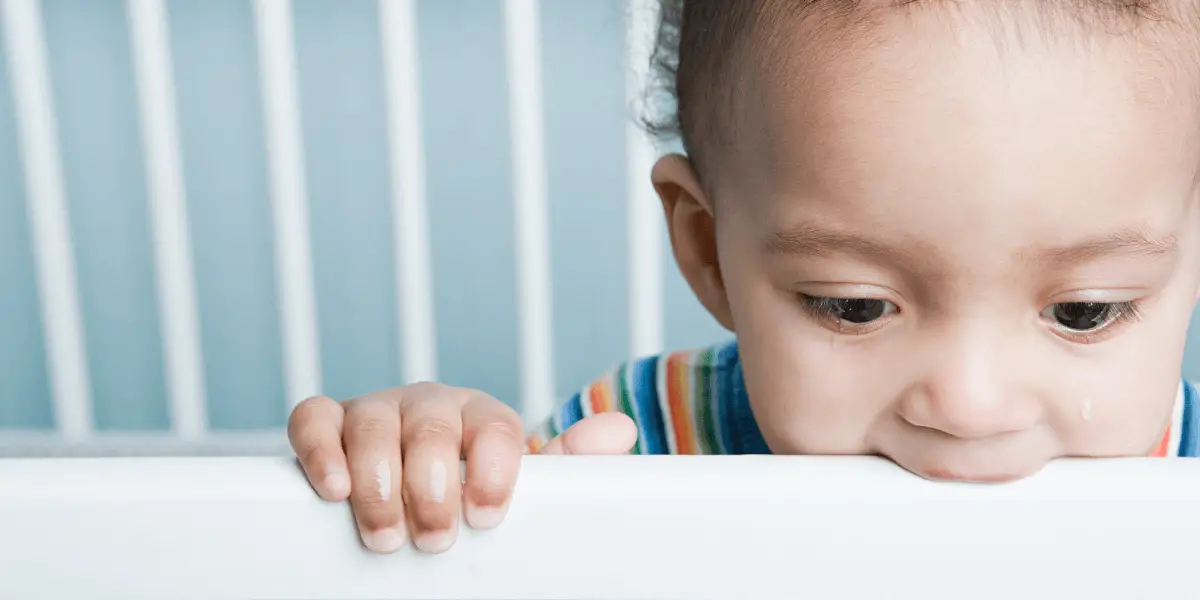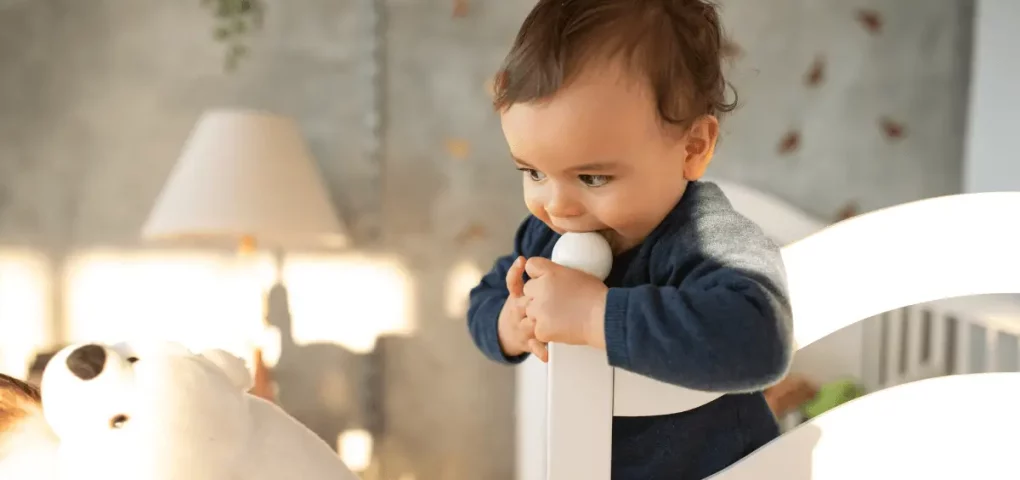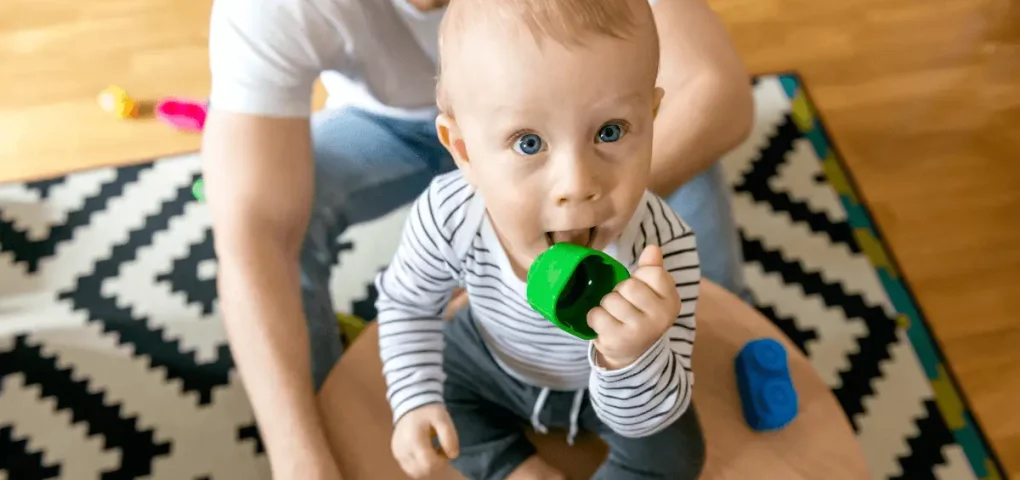
Are babies chewing on crib normal? Yes! This behavior can start early on and continue into toddlerhood. While it’s not entirely clear why babies do this, there are a few theories. Some experts believe that babies chew on their cribs to soothe themselves or relieve boredom. Others think that the act of chewing helps babies learn about their environment and develop new skills.
Regardless of the reason, it’s important to know how to stop this behavior before it becomes a habit! This blog post will discuss why babies chew on their cribs and how to stop this behavior.
Why Do Babies Chew On Their Cribs?

As parents, we love nothing more than watching our babies all the time. However, you might be wondering why your baby suddenly chews on their crib rails! A baby chewing on their cribs can be alarming for most parents. After all, you spent so much time picking out the perfect crib for your little one, and now they’re destroying it! A baby’s crib is meant for a baby to sleep in. It’s not something that they should chew on.
If you leave your baby to chew on a crib railing, there is a risk that babies might harm themselves as they chew on the crib railing. There are times when a crib rail is too hard or has splinters!
If you see your baby chewing on crib rails, find a way to stop your baby. This way, the crib rails will not get damaged. After all, a crib is not a teething toy. Behavioral issues such as baby chewing can be addressed and should not be tolerated.
So, why do babies chew on their cribs? There are a few reasons why babies might engage in this behavior:
Babies are teething
One reason why babies might chew on their cribs is that they’re teething. A teething baby often puts anything and everything into their mouths to soothe their sore gums. This includes their hands, toys, and even furniture! Cribs are no exception. If your baby is teething, you might notice that they start to chew on their crib more frequently.
To help your baby with teething, you can provide teething toys. Teething toys are specifically designed to help soothe a baby’s sore gums. You can also try putting a teething gel on your baby’s gums.
They’re exploring their environment

Another reason why babies chew on their cribs is that they’re exploring their environment. When babies are young, they learn about the world around them. This includes touching, tasting, and chewing everything they can get their hands on!
Cribs are often made of wood or metal, which can be interesting for babies to explore with their mouths. If your baby is chewing on their crib because they’re exploring their environment, you can try to redirect them to another activity.
For example, if you see them starting to chew on the crib, you can give them a toy to hold or chew on instead. You can also try to baby-proof your home as much as possible so that your baby has fewer things to put in their mouth.
Cribs usually have a smooth finish, but if yours is rough or splintering, this could be problematic as it may cause wounds or lacerations. If the finish on your crib is rough, you can sand it down or contact the manufacturer to see if they have any recommendations.
Boredom
Another reason why babies might chew on their cribs is that they’re bored. Babies can get bored just like anyone else! When babies get bored, they might chew their crib railings and destroy them in just a short period! It is up to you as the parent to make sure that your baby is not bored by providing them with stimulating activities such as toys, music, and books.
Yes or No Challenge!
Think you know all about babies and their little quirks? Question Your answer: Correct answer: Your Answers
Attention-Seeking
In some cases, babies chew on their cribs to get attention from their parents. This is especially true if the baby is used to getting a lot of attention when they’re crying or fussing. If your baby is chewing on their crib or crib railings and you think that this might be the reason why, try to ignore the behavior. Once your baby realizes that they’re not getting your attention by chewing on their crib, they’ll likely stop doing it.
Anxiety or Stress
Babies might chew on their cribs if they’re feeling anxious or stressed. Just like adults, babies can get overwhelmed and stressed out too. When babies feel this way, they might start to chew on their cribs as a way to cope with these negative emotions. If you think that your baby is chewing on their crib out of anxiety or stress, it is important to talk to your pediatrician about ways to help them cope with these feelings.
Some things that cause babies anxiety or stress include:
- changes in routine
- loud noises
- being around new people
If you think that your baby is anxious or stressed, try to stick to a routine as much as possible and avoid exposing them to too many new things at once. You should also make sure that their environment is calm and quiet. If your baby is still chewing on their crib despite these efforts, talk to your pediatrician about other ways to help them cope with stress and anxiety.
Babies Chewing on Crib is a Normal Behavior
Although it might be frustrating for parents to see their babies chewing on their cribs, it is actually completely normal behavior for babies. Crib chewing usually starts around six months old and peaks between eight and ten months old. Babies start to have teeth during this time, which can cause them discomfort and pain. Chewing on their cribs gives babies a way to relieve this discomfort.
Crib chewing usually goes away on its own as babies get used to the sensation of teething, and they become less anxious and stressed. However, there are some things parents can do to help stop their babies from chewing on their cribs sooner.
Tips on How to Stop Babies Chewing on Crib

If you want to stop your baby from chewing on their crib, there are a few things you can try:
Give them something else to chew on
Provide your baby with teething toys or other objects that they can safely chew on. This will help satisfy their need to chew and will hopefully stop them from chewing on their cribs.
Apply a bitter-tasting solution
You can buy a commercial teething gel or make your own by mixing water with lemon juice or apple cider vinegar. Apply this solution to your baby’s crib using a cotton swab. The bitter taste will discourage your baby from chewing on the crib. Toddler biting behavior will also be mitigated using this method. You can also purchase crib rail covers and spray them with a bitter-tasting solution.
Monitor your baby’s teething progress
Keep an eye on your baby’s teething progress and anticipate when they’ll be most likely to chew on their crib. If you know when these times are, you can take measures to prevent it from happening, such as providing them with a teething toy or applying the bitter solution ahead of time. You can also give frozen treats as this will calm most babies. Chewing on crib rails is not something that you should allow or tolerate.
Provide a teething toy
Give your baby a clean, safe teething toy to chew on instead of their crib. There are many kinds of teething toys available, so find one that your baby likes and is easy for them to hold or grab. Regularly check their toys to ensure that it’s not broken or coming apart, as this could pose a choking hazard.
Babies engage with teething toys differently compared to other toys. Babies chewing on crib rails or even a bed railing can occur frequently, so make sure to stop them once they do it. This way, you can protect your baby and protect furniture at the same time.
If you’re concerned about your baby chewing on their crib, talk to your pediatrician. They can offer additional advice and support. With a little effort, you can successfully stop this behavior and keep your baby safe.
What Are The Risks Of Babies Chewing On Their Cribs?
There are several risks associated with babies chewing on their cribs. These risks are the following:
Babies ingesting lead paint
Baby cribs made of wood may likely be covered with lead paint. Lead paint is poisonous and can cause serious health problems, such as brain damage. Paint chips that are ingested can also cause choking. Symptoms of brain damage usually manifest later in life and can include learning disabilities, behavioral problems, and seizures.
To avoid these risks, make sure your baby’s crib is made of non-toxic materials and free of lead paint. You can also buy a lead testing kit to test the paint on your crib.
Babies choking on small pieces
Another risk associated with babies chewing on their cribs is choking. When babies chew on their cribs, they can break off small pieces that they could then choke on. To prevent this from happening, inspect your baby’s crib regularly for any signs of damage. If you see any damage, repair it immediately.
You should also keep an eye on your baby while they’re sleeping to make sure they’re not chewing on their crib. If you see them chewing, stop them immediately and give them a toy or something else to chew on.
Babies ingesting wood

Chewing on the crib can also cause babies to ingest small pieces of wood. This can lead to gastrointestinal problems, such as stomach pain and diarrhea. Wood chips can also block babies’ airways, causing them to choke. Therefore, make sure to keep an eye on your baby while they’re in their cribs.
Infection
Cribs are often made of materials that contain bacteria, such as plastic and metal. If your baby puts their mouth on the crib, they could develop an infection. Infections can cause several symptoms, including fever, diarrhea, and vomiting.
Allergic reactions
Some babies are allergic to certain materials, such as latex or paint fumes. If your baby has an allergy and ingests something they’re allergic to, they could have a reaction. Allergic reactions can range from mild (itchiness, swelling) to severe (anaphylaxis).
Babies developing mouth sores
The act of chewing on their crib can cause babies to develop mouth sores. These sores can become infected and lead to other health problems. Therefore, you should always be attentive to your baby’s oral health and hygiene.
What should I do if my baby ingests wood or lead paint?
If your baby ingests wood or lead paint, it’s important to seek medical attention immediately. These substances can be poisonous and cause serious health problems. If you’re concerned about your baby’s chewing habits, talk to their pediatrician. They can help you figure out the cause of the problem and how to address it.
What should I do if my baby does not stop chewing on his crib?

If you have exhausted all of these tips and the problem still persists, it may be time to talk to your pediatrician. They can help you figure out the cause of the problem and how to address it. There are many ways to stop babies from chewing on their cribs, so don’t hesitate to ask for help!
Here’s The Hard Quiz
Now, try the hard quiz.

Question
Your answer:
Correct answer:
Your Answers
When should I be worried about this behavior?
You don’t need to worry if your baby is chewing on their crib because they’re teething. This is a normal part of your baby’s development and will pass in time. However, if your baby is persistently chewing on their crib even when they’re not teething, it may be a sign of an underlying issue. If this is the case, talk to their pediatrician as soon as possible.
Since babies chewing on their cribs is normal behavior, there is no need to worry unless the behavior persists even when your baby is not teething. To play it safe, always consult with your baby’s pediatrician if you have any concerns.
How do I choose the right crib for my baby?
Since babies spend a lot of time in their cribs, it’s important to choose one that is comfortable and safe. When choosing a crib, make sure to pick one that has:
- A firm mattress
- No loose or missing parts
- No sharp edges or corners
- No paint chips or lead paint
By checking these things, you can guarantee that your baby’s crib is safe and comfortable for them to sleep in. However, you should still monitor your baby’s behavior even if his crib is safe. After all, you can never tell when your baby will start to chew on his crib!
Conclusion
So, why do babies chew on their cribs? There are a few reasons why this might happen:
- If your baby is teething, they may start to chew on their crib as a way to relieve the pain.
- Your baby may be bored or restless and start chewing on their crib to pass the time.
- Your baby could be trying to soothe himself by chewing on their crib.
Whatever the reason, it’s important to stop your baby from chewing on their crib. Not only is it dangerous, but it can also damage your furniture. If you’re not sure how to stop your baby from chewing on his crib, try one of these methods:
- Use a deterrent such as a bitter-tasting spray or gel. You can find these at most pharmacies or online.
- Apply double-sided tape to the areas that your baby is chewing on.
- Give your baby a teething toy to chew on instead of his crib.
- Cover the crib areas that your baby is chewing on with a piece of cloth or duct tape.
If you’re still having trouble stopping your baby from chewing on his crib, talk to his pediatrician for more advice. Babies chewing their cribs is a common problem, but it’s one that you can solve with a little patience and effort. With these tips, you’ll have your baby’s teeth marks out of your furniture in no time!


Leave a Reply